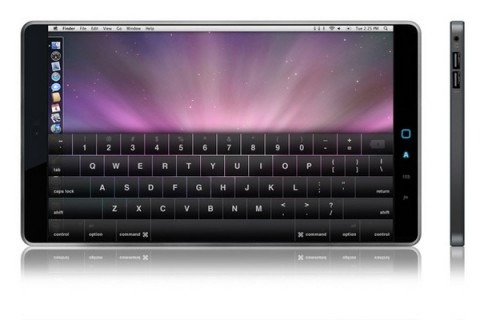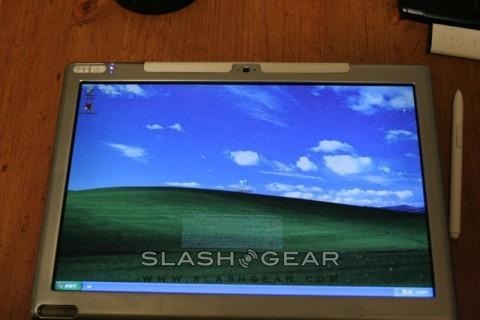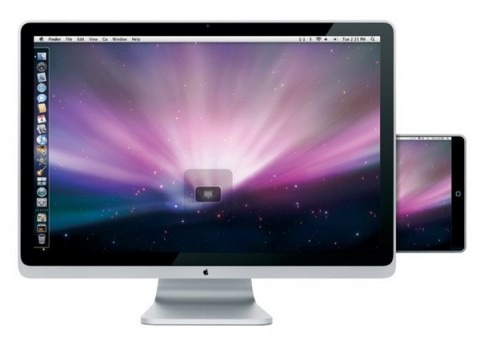He Said, She Said: Is An Apple UMPC More Likely Than A MacBook Touch?
With all the Apple rumors over the past week or so, Brenda and I were discussing whether we'd rather see a grown-up iPod Touch-style UMPC from the company, or a full-sized MacBook Tablet. As a Tablet PC user in the past, I'm a sucker for the full-sized option running OS X; Brenda is more keen on something super-portable that will kick Microsoft's UMPC format into the dust. In the end, we decided to argue it out online and give SlashGear readers the chance to throw in their opinions too; we're calling it "He Said, She Said" and you can read our thoughts (and leave your own) after the cut.Brenda: Apple's goal as of late been to put a computer in your pocket. And while the iPhone does fit in your pocket, it doesn't have all of a computer's functionality yet. But it could. And an UMPC mini-tablet of sorts would be the next logical step toward totally mobile computing. Still maintaining ultimate portability at about double the iPhone's size, an UMPC would contain third-party program support, an easier to use QWERTY keyboard and the look and feel of a standard Mac OS–all notable improvements over the iPhone without sacrificing the sleek and compact design Apple is going for.

Chris: It doesn't matter if you choose to judge a product's potential market by the current users trying to achieve the same thing or by the amount of times it's requested: a full-sized Mac Tablet wins on both counts. Right now huge numbers of digital artists are using MacBooks and Mac desktops hooked up to graphics tablets; there's your instant audience. Not to mention the people tempted by Microsoft's Tablet PC platform but turned off by Windows. Plus it's not as if it would even be that difficult to put together: the hardware for a low-weight slate is right there in the MacBook Air, or you could trade a few ounces for extra grunt and base it on the MacBook Pro.Brenda: Certainly there's a market for a full Mac Tablet, but there's an even larger one for a Mac UMPC. The iPhone was an introduction to Apple for many people, so an UMPC will act as a lure further into the Apple camp. Besides, it's a lot easier to convince consumers to spend extra cash on a device that supplements their regular computer than a whole new computer. The best and most successful technologies have been bold and totally new, but they've also been certain of a market. The Mac UMPC has a built-in market of iPhone users looking for something more. It's that simple.Chris: It could be that simple, or it could just muddy the water. Apple's current ranges are all about clear differentiation: the iPod Touch is the iPhone 3G without cellular or GPS; the MacBook Air is the notebook for users who prioritize travelling ease above all else. A Mac Tablet would be the device for people who live in pen input scenarios rather than keyboard or even iPhone-style touchscreens, not just an oversized iPod Touch. As for the cost, well, there's pretty much no audience like Apple's at being so willing to spend significant amounts! If you add up what a MacBook plus one of Wacom's professional graphic tablets (or, heaven forbid, their Cintiq tablet-display) would cost you, that's a fair amount to play with; plus you get the portability of an all-in-one device.Brenda: While a Mac Tablet would certainly qualify as an all-in-one device, it would only serve a narrow slice of the Apple market pie. Hardly anyone would want to substitute their main computer for a Mac Tablet for one reason and one reason alone–ergonomics. While a tablet is fine if attached to a monitor, it cannot work alone. Think of the crick you'd get in your neck from looking down at it, or the pain in your wrist from trying to work at an awkward, upright angle/ It's just not practical for day-to-day use. An UMPC would act as your computer on the go with tablet properties. It's the best of both worlds and you won't hurt your neck or wrist using it.

Chris: A quick look at Apple's current range shows that they're not afraid of potentially narrow niches – the MacBook Air is one such example – plus the lure of a Mac Tablet would likely bring new buyers in rather than cannibalize existing sales. Are people really going to carry an Apple UMPC as well as an iPhone and/or a MacBook? The iPhone fits in your pocket, whereas a UMPC would have to go into a bag (though I admit it could be a smaller bag than a full-sized notebook). Best of both worlds, to Apple at least, could mean people buying one device instead of two. Don't underestimate the draw of OS X with pen-input; you only have to look at our review of Axiotron's ModBook to see how a non-graphics person can fall in love with Apple software and a stylus to control it.Brenda: While Apple thrives on targeting niche markets, they also have entered a new age–the iPhone age. They've changed how we look at mobile devices and it takes no leap of the imagination to picture an UMPC fitting snugly into consumer's hands. While it won't fit in your pocket, per say, it will be a lightweight device that is much more portable than a tablet–which, to be of any use would need to be rather large–and will give people a way to compute on the go. The touch technology lends itself better to handheld devices and unless you want to tote a stylus, too (which hasn't even been implemented into the Mac Touch tech yet) you're facing an awkward device that would be better off as an occasional tool than a daily must-have. A Mac UMPC would be a device you'd use everyday, at home and out and about, whether it's to answer e-mails, draft reports or surf the web.Chris: I'm not sure graphic artists and other mobile professionals would describe their current tablets as "occasional tools", and it doesn't take much of a jump to imagine both the iPhone's capacitive touch layer as well as a Wacom stylus-specific layer in the same device. There are already Tablet PCs that automatically shut off the finger-touch response when the stylus is nearby. I don't think there's any argument that either a Mac Tablet or UMPC would find buyers, it's more where those buyers come from: stolen from users of Microsoft's Tablet PC or people upgrading from their iPod Touch. Or, to pre-empt you, stolen from Apple's own artist buyers or Microsoft's UMPC niche! It could come down to whichever Apple believes are the biggest audience balanced against its own potential loss from other ranges.

Brenda: Even so, Apple is known for pulling surprises out of their sleeves at the last moment. Rumors of a new product this fall are in hot debate, but it seems both the UMPC and tablet are equally likely. Apple has patents for both such devices, so anything is possible. Since a mod-tablet has already been made, Apple may want to ensure an official product is available to consumers. However, a dockable UMPC could act as a product stepping stone for those less familiar with Apple.Chris: Of course, either of them would undoubtedly bring something new to the niche, and I think both of us would be happy with either a full-sized Tablet or a smaller UMPC. Having a smaller device that docks is something that has come up in concepts (and patents) before; it'd also be a relatively fresh idea, and that would fit in with the "state of the art new product" that Apple's execs promised during the financial conference call. Multitouch could work on both, and handwriting recognition has been around in OS X in the shape of InkWell for some time now. In the end, Apple being Apple, whatever they announce there's a fair chance it's going to be a complete curve-ball.Think we're barking up the wrong (Apple) tree? Want to throw your vote in for a Mac UMPC or a full-sized MacBook Touch tablet? Let us know what you think in the comments.
[UMPC mockup via Flickr]
